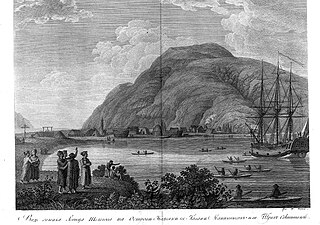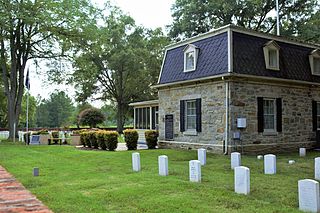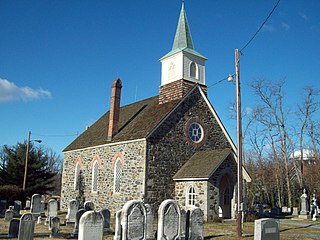
Washington Township is a township in Armstrong County, Pennsylvania, United States. The population was 898 at the 2020 census, a decrease from 923 at the 2010 census.

Three Saints Bay is a 9-mile (14-kilometer)-long inlet on the southeast side of Kodiak Island, Alaska, north of Sitkalidak Strait. It is 60 mi (97 km) southwest of Kodiak. The Three Saints Bay Site is an archaeological site, the location of the first Russian settlement in Alaska, Three Saints Harbor. The settlement was founded in 1784 by Grigory Shelikhov. The main settlement was moved in 1792 to Pavlovskaya Gavan, now known as the city of Kodiak. The Three Saints Bay Site was declared a National Historic Landmark by the United States in 1978.
Seven Pines National Cemetery is a national cemetery located in the Seven Pines area of the unincorporated town of Sandston in Henrico County, Virginia. Although cemetery records state the name is derived from for a group of seven pine trees planted within the national cemetery in 1869 near the intersection of the old Williamsburg-Richmond Stage Road and the Nine Mile Road, the name Seven Pines pre-dates the establishment of the cemetery.

Alexandria National Cemetery is a United States National Cemetery, of approximately 5.5 acres (2.2 ha), located in the city of Alexandria, Virginia. Administered by the United States Department of Veterans Affairs, it is one of the original national cemeteries that were established in 1862. As of 2014, it was site to over 4,500 interments. The cemetery can accommodate the cremated remains of eligible individuals.

Fort Harrison National Cemetery is a United States National Cemetery located seven miles (11 km) south of the city of Richmond, in Henrico County, Virginia. Administered by the United States Department of Veterans Affairs, It encompasses 1.5 acres (0.61 ha), and as of the end of 2005, had 1,570 interments.

Winchester National Cemetery is a United States National Cemetery located in the city of Winchester in Frederick County, Virginia. Administered by the United States Department of Veterans Affairs, it encompasses 4.9 acres (2.0 ha), and as of the end of 2005, it had 5,561 interments. It is closed to new interments.

Staunton National Cemetery is a United States National Cemetery located in the Shenandoah Valley, in Staunton, Virginia. Administered by the United States Department of Veterans Affairs, it encompasses just over a single acre, and as of the end of 2005 had 994 interments. It is closed to new interments, and is maintained by the Culpeper National Cemetery.

Glendale National Cemetery is a United States National Cemetery located near the city of Richmond, in Henrico County, Virginia. Administered by the United States Department of Veterans Affairs, it encompasses 2.1 acres (0.85 ha), and as of the end of 2005 had 2,064 interments. It is closed to new interments.

Burke's Garden is an upland valley and unincorporated community in Tazewell County, Virginia.

Old Salem Church and Cemetery is a historic Lutheran Church and adjacent cemetery located at Catonsville, Baltimore County, Maryland. The main part of the 1849 Gothic Revival church building is a three bay, irregular stone structure approximately 28 feet wide and 42 feet long. It features a gable roof, a short boxy steeple, an entrance porch at the front and an apse at the rear. The interior features a gallery and organ loft has the original tracker organ, which is still hand pumped by a wooden lever on the north side of the case. From early on, the ground to the south of the church was laid out as a cemetery. The church was founded by German Lutheran immigrants.

St. Paul's Lutheran Church, Parsonage and Cemetery is a historic Lutheran church, parsonage, and cemetery in Wurtemberg in Dutchess County, New York.

St. John's Evangelical Lutheran German Church and Cemetery, also known as St. John's Lutheran Church and Cemetery and as White Church, is located in the vicinity of Hayes Center in Hayes County, Nebraska. It was listed on the National Register of Historic Places in 1985. The listing includes a 10 acres (4.0 ha) area with the church as a contributing building and the cemetery as a contributing site.

Montra is an unincorporated community in Jackson Township, Shelby County, Ohio, United States. Established in the middle of the nineteenth century, the small community is prominent because of a landmark church, Emanuel Lutheran Church of Montra.

Sharon Lutheran Church and Cemetery is a historic Lutheran church and cemetery located near Ceres, Bland County, Virginia. The church was built in 1883, and is a one-story, frame church, four bays long, with round-arched, stained-glass windows and a gable roof. It features a projecting square tower with a bell-cast pyramidal roof and cross finial on the entrance facade. The adjacent cemetery was established in 1817, and includes a collection of rare Germanic gravestones which are stylistically related to those found in the outlying churches of the Wythe County German settlements.

Zion Evangelical Lutheran Church Cemetery is a historic Evangelical Lutheran cemetery and national historic district located near Speedwell, Wythe County, Virginia. The cemetery includes approximately 250–300 total gravestones. Forty two of the stones have dates ranging from the 1790s to 1840, but all were carved between about 1835 to 1840. It is likely that a skilled carver moved to the area in the mid-1830s and provided stones for many graves, which formerly had been marked with improvised stone or wooden markers, then completed his work by 1840. The thick sandstone markers are Germanic stones with surviving inscriptions.

Burkes Garden Central Lutheran Church, listed as Burkes Garden Central Church and Cemetery, is a historic Lutheran church, cemetery, and national historic district located at Burke's Garden, Tazewell County, Virginia. The church was built in 1875, and is a plain rectangular frame building, two bays long, with a steep gable roof. It originally served multiple denominations as a union church but has exclusively served the Lutheran denomination in modern times.

St. Peter's Evangelical Lutheran Church is a historic church building in northeastern Darke County, Ohio, United States. Located south of the village of Versailles, it is believed to be the region's last remaining log church built during the period of settlement. Although Wayne Township was settled primarily by individuals of English and French descent, the members of St. Peter's Church were Germans. The church was built in 1850 by its members upon land donated by Frederick Frengott Seibt; the congregation erected their church on the lower portion of this ground and plotted their cemetery on the upper portion. Since that time, the structure has been modified little; the only significant change has been the addition of a small belfry in 1867. Inside, the church retains a high degree of historic integrity: still in place are the wood-burning stove, the reed organ, the hand-carven pulpit, and the original sandblasted windows.

Our Savior's Scandinavian Lutheran Church, also known as Our Savior's Lutheran Church or Our Savior's Evangelical Lutheran Church is located in Ward County, North Dakota. It is situated one mile north of State Route #50 and one quarter mile west of Ward County Highway #1 near Coulee, Mountrail County, North Dakota. The church and its cemetery were listed on the National Register of Historic Places in 2005.

Kimberling Lutheran Cemetery is a historic Lutheran cemetery and national historic district located near Rural Retreat, Wythe County, Virginia. The cemetery includes approximately about 50 early Germanic sandstone monuments dating from 1800 to 1850. The associated Kimberlin Lutheran Church was built in 1913, and is a large frame structure with two unequal-sized towers.
St. Luke's Lutheran Church Cemetery, also known as Sandy Creek Cemetery, is a historic church cemetery located near Tyro, Davidson County, North Carolina. It is associated with the St. Luke's Lutheran Church, founded in 1790 as Swicegood Meeting House. It contains approximately 300 burials, with the earliest gravestone dated to 1804. It features a unique collection of folk gravestones by local stonecutters erected in Davidson County in the late-18th and first half of the 19th centuries.






















